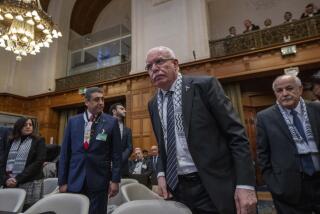New Israeli laws will increase discrimination against Arabs, critics say
Israel’s conservative-led Knesset adopted two controversial laws Wednesday that critics warned will worsen discrimination against the nation’s Arab minority and make it easier to prevent Arab citizens from moving into hundreds of Jewish towns and villages.
One law legalizes the practice of using “admissions committees” in small towns in the Negev and Galilee to reject would-be residents based on their social “suitability,” a vague term opponents fear could be used to bar gays, black Israelis, single women, Christians, Muslims and secular families as well as Arabs.
The second law is aimed at imposing fines on Arab towns, local authorities and state-funded organizations that commemorate Nakba Day, which falls near Israel’s Independence Day. Some Arab Israelis refer to the day Israel gained statehood as a nakba, or catastrophe, because it resulted in the displacement of 700,000 Palestinians.
“This is not just a racist law, it’s an oppressive law,” said Hassan Jabareen, founder of Adalah, an Israeli advocacy group focusing on legal rights of Arab citizens. “It sends the public message that Israel not only doesn’t respect the history and memory of the Palestinian people, but they now prohibit Palestinians living under their regime from commemorating their own history and identity.”
He said the laws are the latest example of state-condoned discrimination against Arab citizens, who also receive unequal treatment in their ability to purchase or lease land and to obtain citizenship for spouses. He said the laws would heighten tension within Israel’s Arab minority, which accounts for about 20% of the population.
During a spirited Knesset debate that began Tuesday night and continued into early Wednesday, Arab lawmakers condemned the measures as racist and antidemocratic.
“This is a black night,” said Jamal Zahalka of the Arab-led Balad Party. “We will turn to the world for protection from your government, which acts with hostility toward the Arab public.”
Zahalka said the admissions committee law will in effect prevent Arabs from living in 70% of the country and that the Nakba law will “trample” free speech.
Israeli Prime Minister Benjamin Netanyahu defended the laws and said Israel’s commitment to free speech and democracy was evident in the fact that Zahalka and other Arab lawmakers are able to stand in the parliament and voice their criticisms.
“Their claims sound hollow when we see what’s going on around us,” Netanyahu said, referring to the recent regional unrest in the Mideast. “There is no Arab country where Arabs have the rights and democratic freedom to express themselves as they do in the state of Israel.”
Supporters of the admissions committee bill said it was intended to preserve the culture and identity of small communities. They noted that the law contains explicit bans on discriminating against would-be residents based on race or religion.
Critics, however, say ambiguity surrounding the idea of social suitability gives the privately run committees, consisting of residents and representatives of national Jewish organizations, wide latitude over public lands.
Arab and civil rights groups are already challenging the legality of such committees, which function in more than 500 Israeli towns, according to Jabareen.
During a Supreme Court hearing last month, justices expressed reservations about the practice.
An earlier version of the Nakba bill would have imposed jail time on violators and banned the use of the term nakba. The final version allows the government to fine local bodies and groups that mark Nakba Day, support armed resistance or racism against Israel, or debase the Israeli flag.
Two Israeli advocacy groups, the Abraham Fund and the Assn. for Civil Rights in Israel, said Wednesday that they plan to file a new lawsuit in the Supreme Court to overturn the laws.
More to Read
Start your day right
Sign up for Essential California for news, features and recommendations from the L.A. Times and beyond in your inbox six days a week.
You may occasionally receive promotional content from the Los Angeles Times.





